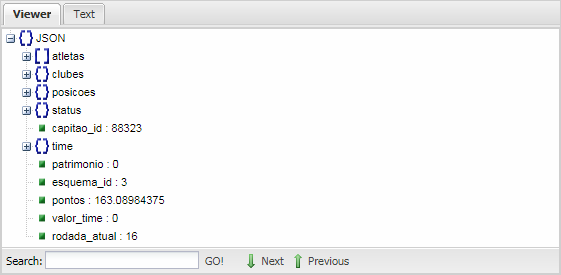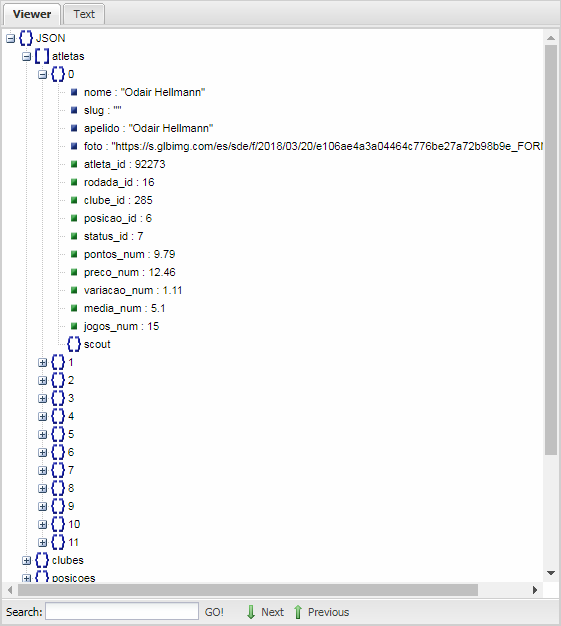[ad_1]
First of all you need to examine the structure of the JSON response, using any online JSON viewer (e. g. http://jsonviewer.stack.hu/), where you can see that your JSON object contains atletas array, clubes, posicoes, status, time objects, and several properties with scalar values:
Going further there are objects within atletas array, each of them contains some properties that can be populated on the worksheet:
Here is VBA example showing how that values could be retrieved. Import JSON.bas module into the VBA project for JSON processing.
Option Explicit
Sub Test()
Dim sJSONString As String
Dim vJSON
Dim sState As String
Dim aData()
Dim aHeader()
Dim vResult
Dim sName
' Retrieve JSON content
With CreateObject("MSXML2.XMLHTTP")
.Open "GET", "https://api.cartolafc.globo.com/time/slug/umo/16", True
.send
Do Until .readyState = 4: DoEvents: Loop
sJSONString = .responseText
End With
' Parse JSON sample
JSON.Parse sJSONString, vJSON, sState
If sState = "Error" Then
MsgBox "Invalid JSON"
End
End If
' Example of processing single property
' Get 'atletas' array of objects, there is no Set keyword for arrays
vResult = vJSON("atletas")
'' Optional get 'clubes' object of objects, Set keyword used for objects represented by dictionaries
'' Set vResult = vJSON("clubes")
' Convert to 2d array
JSON.ToArray vResult, aData, aHeader
' Output 2d array to first worksheet
With ThisWorkbook.Sheets(1)
.Cells.Delete
.Cells.WrapText = False
OutputArray .Cells(1, 1), aHeader
Output2DArray .Cells(2, 1), aData
.Columns.AutoFit
End With
' Remove 'atletas' array from root object
vJSON.Remove "atletas"
' Remove all worksheets but the first
Application.DisplayAlerts = False
With ThisWorkbook.Sheets
Do Until .Count = 1
.Item(.Count).Delete
Loop
End With
Application.DisplayAlerts = True
' Example of processing multiply properties on separate worksheets
' Processing all the rest of objects and arrays
For Each sName In vJSON
' Check if the property is array or object
If IsArray(vJSON(sName)) Or IsObject(vJSON(sName)) Then
' Convert to 2d array
JSON.ToArray vJSON(sName), aData, aHeader
' Output 2d array to worksheet
With ThisWorkbook.Sheets.Add ' Create new worksheet for output
OutputArray .Cells(1, 1), aHeader
Output2DArray .Cells(2, 1), aData
.Columns.AutoFit
End With
' Remove output object from root object
vJSON.Remove sName
End If
Next
' Processing all the rest of properties with scalar values which remain in root object
' Convert root object to 2d array
JSON.ToArray vJSON, aData, aHeader
' Output 2d array to worksheet
With ThisWorkbook.Sheets.Add ' Create new worksheet for output
OutputArray .Cells(1, 1), aHeader
Output2DArray .Cells(2, 1), aData
.Columns.AutoFit
End With
' Or the whole JSON structure could be flattened and output to worksheet
' Parse JSON sample
JSON.Parse sJSONString, vJSON, sState
' Flatten JSON
JSON.Flatten vJSON, vResult
' Convert flattened JSON to 2d array
JSON.ToArray vResult, aData, aHeader
' Output 2d array to worksheet
With ThisWorkbook.Sheets.Add ' Create new worksheet for output
OutputArray .Cells(1, 1), aHeader
Output2DArray .Cells(2, 1), aData
.Columns.AutoFit
End With
MsgBox "Completed"
End Sub
Sub OutputArray(oDstRng As Range, aCells As Variant)
With oDstRng
.Parent.Select
With .Resize(1, UBound(aCells) - LBound(aCells) + 1)
.NumberFormat = "@"
.Value = aCells
End With
End With
End Sub
Sub Output2DArray(oDstRng As Range, aCells As Variant)
With oDstRng
.Parent.Select
With .Resize( _
UBound(aCells, 1) - LBound(aCells, 1) + 1, _
UBound(aCells, 2) - LBound(aCells, 2) + 1)
.NumberFormat = "@"
.Value = aCells
End With
End With
End Sub
The output for atletas array for me is as follows:
BTW, the similar approach applied in other answers.
1
[ad_2]
solved Import data from an API link that contains JSON to EXCEL [closed]


